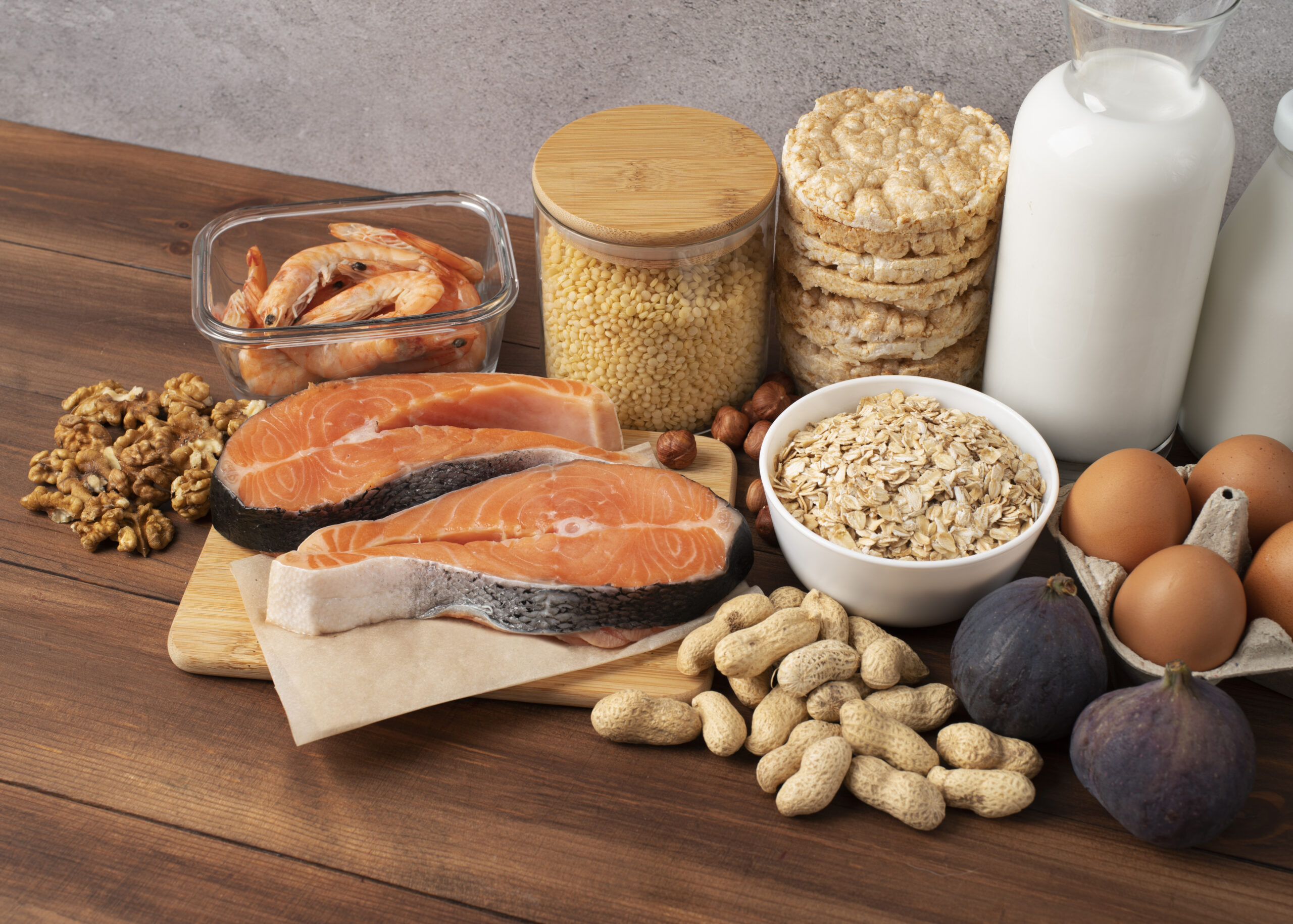The Ultimate Guide to Muscle Building Supplements for Impressive Gains 2023

The muscular system holds significant importance in overall well-being, enabling fluid movement, preserving strength, and acting as a preventive measure against injuries. To optimize the enhancement and expansion of muscles, a phenomenon referred to as muscle hypertrophy, maintaining a well-rounded diet and engaging in a workout regimen incorporating resistance training are crucial. Additionally, specific nutritional supplements have the potential to facilitate desired muscle growth outcomes, regardless of whether the objective is participation in bodybuilding competitions or simply cultivating increased strength and agility in daily life.
Amidst the multitude of supplements available in the market, discerning which ones merit consideration can prove challenging, especially in the context of supporting muscle development. This comprehensive guide outlines the most effective supplements for promoting muscle growth, alongside expert-endorsed strategies for achieving and sustaining muscle gains in a manner that is both effective and efficient.
The Significance of Nutrition in Muscle Building

Proper nutrition plays a important role in the process of muscle building, serving as a cornerstone for achieving optimal results in fitness and strength endeavors. The intricate relationship between nutrition and muscle growth is grounded in the fundamental principle that the body requires essential nutrients to fuel, repair, and sustain the physiological changes associated with increased muscle mass.
Muscle growth, scientifically termed “hypertrophy,” involves the enlargement of individual muscle fibers through various mechanisms, primarily driven by physical stress induced during resistance training.
However, the effectiveness of these training efforts can be significantly influenced by the nutritional support provided to the body.
top supplements for muscle building, As Per the Professionals
Individual nutritional requirements may differ, yet there exist a number of supplements that scientific research indicates could potentially enhance muscle growth and performance. Presented below are five supplements, validated by scientific evidence and endorsed by experts, that warrant contemplation if your fitness aspirations center around augmenting(size) muscle mass.
- Whey protein powder.
- Beta-Alanine.
- Creatine monohydrate.
- Essential amino acids.
- Beta-hydroxy-Beta-Mthylebutyrate.
whey protein powder
Whey protein powder is a favored choice endorsed by nutrition experts for muscle growth. It’s a complete protein, containing all essential amino acids and easily digestible, making it ideal for fueling muscle growth. Research shows it stimulates muscle protein synthesis and reduces breakdown, promoting muscle mass when consumed adequately. Incorporating a scoop in shakes helps meet daily protein needs, especially if engaged in regular strength training.
Scientific research corroborates the utilization of whey protein to activate muscle protein synthesis while concurrently diminishing muscle protein breakdown. This combined effect leads to a positive surge in muscle mass when consumed in appropriate quantities.
Protein Accounts for only 5% to 10% of energy used, But its plays a critical role in health and performance of athlete. Protein is needed to maintain and repair lean muscle tissues, including muscle. But muscles Growth is stimulated by exercise, not by eating more protein. A Diet that contains the Recommended Dietary Allowance (RDA) for Protein 0.7 to 1 gram per kilogram of body weight provides enough protein for the most active people. For competitive athletes who participate in endurance and strength sports may need more protein. In endurance event such as Marathons, protein is used for maintain blood glucose to provide this endurance for athlete may need to consume 1.2 to 1.4 gram protein/kg of body weight / day. Strength athletes who need to develop new muscles protein may benefit From 1.2 to 1.7 gm protein / Body weight / day.

Beta-alanine
Beta-alanine, an amino acid, plays a vital role in augmenting muscle performance by elevating carnosine levels in the body—a valuable antioxidant. Carnosine not only supports muscle contractions but also effectively postpones the onset of muscle fatigue during physical activity, resulting in improved exercise capacity and overall performance during workouts.
According to Experts, recent research indicates that incorporating beta-alanine supplementation can lead to increased power output during maximal lifting sessions. Furthermore, various studies highlight a correlation between beta-alanine intake and the enhancement of lean muscle composition. While it may not fit the traditional mold of weight gain supplements, beta-alanine can amplify training intensity, subsequently contributing to the development of lean body mass.
Even though the body can synthesize beta-alanine internally, studies recommend a daily supplementation of 4 to 6 grams for those seeking to optimize their workout outcomes. Beta-alanine is commonly available in both tablet and powder forms, offering individuals flexibility in their preferred mode of consumption.

MUSCLETECH NITRO TECH WHEY PROTEIN
- 30g protein
- 3g creatine monohydrate
- 6.7g BCAA
Creatine Monohydrate
Studies indicate that supplementing with creatine monohydrate can enhance muscle strength and performance, especially in individuals engaged in brief, high-intensity resistance exercises.
Although the body produces a small amount of creatine naturally and it’s present in foods like red meat and fish, these sources often provide inadequate quantities. This gap is the reason creatine supplementation is prevalent. According to the experts creatine is commonly available in powder form, conveniently dissolving in various beverages like coffee, juice, or water.
Typically, creatine supplementation commences with a loading phase, during which a larger amount is ingested to quickly saturate muscles. This phase is succeeded by a maintenance dose. Experts advocate for an initial loading phase of 0.3 grams of creatine per kilogram of body weight daily, usually spanning five to seven days. Subsequently, the maintenance phase involves 0.03 grams of creatine per kilogram of body weight daily, lasting between four to 10 weeks
essential amino acids (EAA)
Experts says that, “Amino acids serve as the fundamental building blocks of proteins.” When protein is consumed, the body breaks it down into its constituent amino acids. These amino acids then play a crucial role in repairing and fostering the growth of muscle tissue.
In total, there are 22 amino acids, with nine being deemed essential due to the body’s inability to synthesize them independently. This necessitates obtaining essential amino acids (EAAs) from dietary sources such as chicken, beef, dairy, eggs, or through supplementation, as highlighted by Dr. Smith-Ryan.
The International Society of Sports Nutrition notes that the intake of 6 to 12 grams of EAAs before and/or after resistance training can activate muscle protein synthesis, with doses ranging from 10 to 12 grams being potentially more impactful[1]. EAA supplements are typically accessible in the form of capsules or flavored powders, which can be mixed with water or other beverages.
Beta-Hydroxy-Beta-Methylbutyrate (HMB)
Beta-Hydroxy-Beta-Methylbutyrate (HMB) is a naturally occurring compound that has garnered attention for its potential benefits in health and performance enhancement. HMB is derived from the metabolism of the essential amino acid leucine, a building block of proteins. Its ability to modulate muscle protein breakdown and synthesis has led to its exploration in various contexts, including sports nutrition and muscle-related disorders.
In the realm of sports and exercise, HMB has gained popularity as a potential ergogenic(increasing capacity for bodily or mental labor especially by eliminating fatigue symptoms)aid. It is believed to work by reducing muscle protein breakdown, which can occur during intense training. By doing so, HMB might aid in muscle recovery and promote muscle growth. This has implications for both athletes aiming to optimize their performance and individuals engaged in resistance training to enhance their muscle mass. Some studies suggest that HMB supplementation, when combined with structured exercise, could lead to greater gains in strength and lean body mass compared to exercise alone. While HMB’s mechanisms of action are promising, it’s essential to interpret the research findings cautiously. Some studies have reported positive outcomes with HMB supplementation, while others show more modest effects. Factors such as dosage, training protocols, and individual variability can influence its efficacy. Additionally, the long-term effects of HMB use and any potential side effects need further exploration.
It holds promise as a compound that could contribute to muscle health and performance enhancement. Its potential to modulate muscle protein breakdown and synthesis makes it an intriguing candidate for sports nutrition and clinical applications. However, more research is needed to fully understand its mechanisms of action, optimal dosages, and long-term effects. Whether for athletes striving to excel in their endeavors or individuals seeking to maintain muscle function, HMB’s role in the broader landscape of health and performance continues to unfold. As with any health-related consideration, informed decision-making supported by professional guidance is key to harnessing the potential benefits of HMB effectively and safely.
Essential Guidelines for Effective Muscle Building
The pursuit of increased muscle mass is a common objective for many individuals who seek to enhance their physical strength and overall physique. To embark on a fruitful journey towards successful muscle gain, it’s crucial to keep several key principles in mind:
Structured Resistance Training: Embark on a well-structured resistance training program that revolves around weightlifting or the use of resistance bands. Incorporating a diverse array of exercises that target various muscle groups is pivotal in ensuring a harmonious and well-rounded development.
Progressive Overload: Gradually elevate the amount of resistance or weight you lift as you progress. This incremental approach compels your muscles to continuously adapt and grow in response to the escalating challenge.
Nutrient-Rich Diet: Prioritize a diet that’s rich in essential nutrients, encompassing an appropriate balance of proteins, carbohydrates, fats, vitamins, and minerals. Protein assumes a particularly vital role in muscle repair and growth. Option for lean meats, poultry, fish, dairy products, legumes, and plant-based protein sources to support your journey.
Adequate Protein Intake: Make it a point to incorporate a sufficient quantity of protein into each meal. As a general guideline, a daily protein intake of approximately 1.2 to 2.0 grams per kilogram of body weight is recommended for most individuals who are keen on fostering muscle growth.
Maintain Consistency: Attaining significant muscle growth demands consistent effort and patience. Adhering faithfully to your workout regimen and nutritional plan is vital, as tangible results gradually emerge over time.
Sources
- Healthy Muscles Matter. National Institute of Arthritis and Musculoskeletal and Skin Diseases. Accessed 2/8/2023.
- Biochemistry, Essential Amino Acids. StatPearls [Internet]. Accessed 2/8/2023.
Workout Supplements. Harvard School of Public Health. Accessed 2/8/2023.
- Hall M, Trojan T. Creatine supplementation. Current Sports Medicine Reports. 2013;12(4):240-244
Naclerio F, Seijo M. Whey protein supplementation and muscle mass: current perspectives. Dove Press. 2019;2019(11):37-48.




Right sir
🙂